| Listing 1 - 10 of 31 | << page >> |
Sort by
|
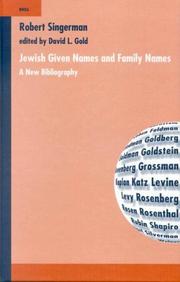
ISBN: 1280464828 9786610464821 1423705807 9047400992 9781423705802 9789047400998 9789004121898 9004121897 9781280464829 9004121897 Year: 2001 Publisher: Leiden ; Boston : Brill,
Abstract | Keywords | Export | Availability | Bookmark
 Loading...
Loading...Choose an application
- Reference Manager
- EndNote
- RefWorks (Direct export to RefWorks)
This work identifies and describes over 3000 books, essays in books, and articles on Jewish given names and family names throughout history, spanning the Biblical period to modern times.
Names, Personal --- Names in the Bible --- Anthroponomy --- Baby names --- Christian names --- Family names --- Forenames --- Names of families --- Names of persons --- Personal names --- Surnames --- Names --- Onomastics --- Jewish
Book
ISSN: 09383387 ISBN: 3110909448 9783110909449 3484555114 Year: 1998 Volume: 11 Publisher: Tubingen : Max Niemeyer Verlag,
Abstract | Keywords | Export | Availability | Bookmark
 Loading...
Loading...Choose an application
- Reference Manager
- EndNote
- RefWorks (Direct export to RefWorks)
Este volumen contiene las Actas del IX Coloquio PatRom, organizado por el centro PatRom de Uviéu/Oviedo en 1995, y en el que se intentó acercar a los investigadores europeos del proyecto PatRom al asturiano, romance situado en el norte de España entre el gallego y el castellano.
Names, Personal --- Anthroponomy --- Baby names --- Christian names --- Family names --- Forenames --- Names of families --- Names of persons --- Personal names --- Surnames --- Names --- Onomastics --- Roman --- Romance
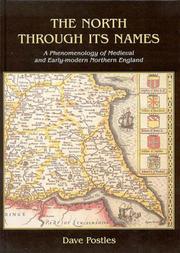
ISBN: 1782975519 1782975497 9781782975496 9781782975519 9781842171769 1842171763 1785709798 9781785709791 Year: 2007 Publisher: Oxford : Oxbow Books,
Abstract | Keywords | Export | Availability | Bookmark
 Loading...
Loading...Choose an application
- Reference Manager
- EndNote
- RefWorks (Direct export to RefWorks)
The North of England and northern-ness are elusive concepts, both academically and in popular perception. This volume in the English Surnames Survey series looks at what can be learned about the idea of the 'North' of England as a distinct identity from its surnames. The personal names from the north during the medieval/early modern period are linguistic phenomena, incorporating dialect speech that defined a northern consciousness, and in this way are an invaluable resource in exploring a northern identity. Dave Postles attempts to reconstruct the language of the speech community and communities of northern England through the reporting and recording of personal name elements, examining the evidence from patronyms, metronyms and personal names, as well as occupational bynames, and even nicknames. He identifies many distinctions including the longer continuity of insular personal names in the north which implies a cultural dissonance with the south perhaps in terms of a residual culture, but equally perhaps in terms of a resistant or oppositional culture. Since (what others might assume to be) insalubrious nickname bynames continued later in the north than in more southerly environments, northern speech through names could be represented as (by northerners) direct and (by southerners) uncivil.
Names, Personal --- Anthroponomy --- Baby names --- Christian names --- Family names --- Forenames --- Names of families --- Names of persons --- Personal names --- Surnames --- Names --- Onomastics --- History
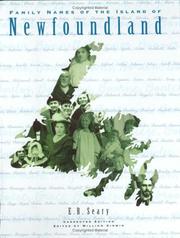
ISBN: 1282855263 9786612855269 0773567410 9780773567412 0773517820 9780773517820 Year: 1998 Publisher: St. John's : Montreal & Kingston : J.R. Smallwood Center for Newfoundland Studies, Memorial University of Newfoundland ; McGill-Queen's University Press,
Abstract | Keywords | Export | Availability | Bookmark
 Loading...
Loading...Choose an application
- Reference Manager
- EndNote
- RefWorks (Direct export to RefWorks)
Byrne, Chaffey, Fahey, Fizzard, Fudge, Grouchy, Hynes, Inkpen, Lyver, McLaughlin, Miles, Murphy, Puddester, Quirk -- the names themselves are evocative of Newfoundland. Family Names of the Island of Newfoundland traces the origins of almost 3,000 surnames found on the Island and provides an engaging and comprehensive collection of etymology, genealogy, and Newfoundland history. The introduction presents a fascinating discussion of the history and linguistic origins of surnames found in Newfoundland, which come from many different cultures, notably English, Welsh, Irish, Scottish, French, Syrian, Lebanese, and Mi'kmaq. The main body of the book comprises a dictionary of surnames in the province based on data collected from provincial voting lists, family records, government documents, and newspaper reports dating back to the seventeenth century. Each entry includes variant spellings and cross-references of the surname, the countries in which the name originated, and its meaning. Newfoundland place names associated with the surname are also given. The book also includes a ranking of the most common surnames in Newfoundland and a comparative analysis of the frequency of surnames in Scotland, Ireland, England, and Newfoundland. Originally published in 1977, Family Names of the Island of Newfoundland is a unique reference work, giving Newfoundlanders, both in the province and away, a fascinating look at their roots. This edition incorporates a number of additions and corrections and has been completely reset in a sturdier and more convenient format. It will be of great use to individuals tracing their ancestors and to genealogists researching early settlers in Newfoundland.
Names, Personal --- Anthroponomy --- Baby names --- Christian names --- Family names --- Forenames --- Names of families --- Names of persons --- Personal names --- Surnames --- Names --- Onomastics --- Newfoundland, Island of (N.L.) --- Island of Newfoundland (N.L.) --- Newfoundland, Island of (Nfld.)
Book
ISBN: 1282296396 9786612296390 3484971452 9783484971455 3484507012 Year: 2007 Publisher: Tubingen : Niemeyer,
Abstract | Keywords | Export | Availability | Bookmark
 Loading...
Loading...Choose an application
- Reference Manager
- EndNote
- RefWorks (Direct export to RefWorks)
Le »Dictionnaire historique de l'anthroponymie romane« présente, sous forme d'articles du type de ceux des grands dictionnaires étymologiques de langue (»FEW«, »LEI«), les noms de personne issus de lexèmes, depuis la période médiévale jusqu'à nos jours, selon une classification pertinente établie au sein du projet. Les étymons sont des éléments du lexique (restriction imposée au détriment des noms de famille issus de toponymes et de noms de baptême) qui sont productifs dans au moins deux des quatre superdomaines linguistiques (Ibéroromania, Galloromania, Italoromania, domaine roumain). Un premier volume du dictionnaire, consacré aux étymons relatifs à une partie du corps humain (Volume II/1), a paru précédemment en 2004. Le présent volume s'ouvre par une introduction au projet PatRom (D. Kremer) et une présentation davantage centré sur le dictionnaire lui-même (A. Cano et B. Schmid). Suit le ›Cahier des normesrédactionnelle‹, particulièrement précis et original, rédigé sous la direction de E. Buchi, fournissant une double grille de classement géographique des nombreux matériaux (grille géo-linguistique pour les noms de personnes anciens, grille géo-administrative pour les noms de famille contemporains). La méthode de classement et d'analyse morphologique des noms de personne par rapport à l'étymon est exposée par N. Weinhold; sont jointes les bases étymologiques des préfixes et surtout des suffixes. Diverses bibliographies coordonnées par C. Maas-Chauveau présentent les principaux travaux d'onomastique (anthroponymie et toponymie) et de lexicographie romanes utilisés lors de la rédaction du dictionnaire; ces bibliographies sont doublées par des index par sigles. Ne manquent plus que les bibliographies des sources pour disposer de toutes les clés nécessaires à l'utilisation et à la compréhension du dictionnaire PatRom, dont un prochain volume devrait paraître en 2007.
Names, Personal --- Romance languages --- Romance personal names --- Anthroponomy --- Baby names --- Christian names --- Family names --- Forenames --- Names of families --- Names of persons --- Personal names --- Surnames --- Names --- Onomastics --- Roman. --- Romance. --- Etymology --- Names.
Book
ISBN: 3110314053 9783110314052 9783110314014 3110314010 Year: 2013 Publisher: Berlin ; Boston : De Gruyter,
Abstract | Keywords | Export | Availability | Bookmark
 Loading...
Loading...Choose an application
- Reference Manager
- EndNote
- RefWorks (Direct export to RefWorks)
Among the curiosities of the Soviet period are the "revolutionary" first names that were inspired by the communist ideology. The Orthodox Church lost its monopoly over the giving of names with the Bolshevik seizure of power. Instead of a name taken from the church calendar it was possible to choose any desired word as a first name. Often only specialists recognize that the name "Melor" for example stands for the initials of Marx, Engels, Lenin and October Revolution. And "Trolebuzin" has nothing to do with the trolleybus, but originated from the first letters of Trotsky, Lenin, Bukharin and Zinov'ev. The "revolutionary" namegiving was only a temporary phenomenon, but the unusual creations appeared and still continue to appear in a not insignificant number as first names and patronymics. This volume throws light upon a so far unexplored chapter of modern Russian history and for the first time makes possible the deciphering of the artificially constructed first names that were created wholesale after 1917, such as "Lenmar", "Marksen" or "Ninel". Zu den Kuriositäten der Sowjetzeit gehören die von der kommunistischen Ideologie inspirierten neuen "revolutionären" Vornamen. Mit der bolschewistischen Machtergreifung verlor die orthodoxe Kirche das Monopol der Namengebung. Statt eines Namens aus dem Kirchenkalender konnte nun jedes beliebige Wort als Vorname gewählt werden. Oft ist nur für Spezialisten erkennbar, daß sich z.B. hinter "Melor" die Initialen von Marx, Engels, Lenin und Oktoberrevolution verbergen, und "Trolebuzin" nichts mit einem Trolleybus gemeinsam hat, sondern aus den Anfangsbuchstaben von Trockij, Lenin, Bucharin und Zinov'ev entstand. Die "revolutionäre" Vornamengebung war zwar nur eine vorübergehende Erscheinung, die ungewöhnlichen Kreationen kamen und kommen aber immer noch in beträchtlicher Zahl als Vor- und Vatersnamen vor. Das vorliegende Lexikon beleuchtet ein bislang unerforschtes Kapitel der neueren russischen Geschichte und Onomastik und ermöglicht erstmalig das Dechiffrieren der nach 1917 massenweise gebildeten künstlichen Vornamen wie "Lenmar", "Marksen" oder "Ninel".
Names, Russian --- Names, Personal --- Russian language --- Russian names --- Anthroponomy --- Baby names --- Christian names --- Family names --- Forenames --- Names of families --- Names of persons --- Personal names --- Surnames --- Names --- Onomastics --- Russian --- New words --- Political aspects --- Lexicon. --- Soviet Union. --- forenames. --- onomastics.
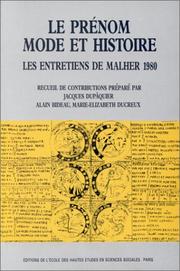
ISBN: 2713208408 9782713208409 Year: 1984 Volume: 10 Publisher: Paris: École des hautes études en sciences sociales,
Abstract | Keywords | Export | Availability | Bookmark
 Loading...
Loading...Choose an application
- Reference Manager
- EndNote
- RefWorks (Direct export to RefWorks)
Names, Personal --- -Names, Personal --- -Congresses --- Congresses --- French --- -801.313 --- -Anthroponomy --- Baby names --- Christian names --- Family names --- Forenames --- Names of families --- Names of persons --- Personal names --- Surnames --- Names --- Onomastics --- Persoonsnamen --- Congresses. --- 801.313 --- -Persoonsnamen --- 801.313 Persoonsnamen --- -801.313 Persoonsnamen --- Anthroponomy --- French&delete& --- Prénoms. Histoire. --- Voornamen. Geschiedenis. --- -Prénoms. Histoire. --- Names, Personal - - Congresses --- Names, Personal - - Congresses - France --- -Names, Personal - - Congresses - French --- -Names, Personal -
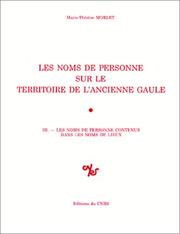
ISBN: 2222034272 9782222034278 Year: 1985 Publisher: Paris: CNRS,
Abstract | Keywords | Export | Availability | Bookmark
 Loading...
Loading...Choose an application
- Reference Manager
- EndNote
- RefWorks (Direct export to RefWorks)
Names, Personal --- Noms de personnes --- Noms de personnes gaulois --- -Civilization, Medieval --- Civilization, Medieval --- Medieval civilization --- Middle Ages --- Anthroponomy --- Baby names --- Christian names --- Family names --- Forenames --- Names of families --- Names of persons --- Personal names --- Surnames --- History --- Civilization --- Chivalry --- Renaissance --- Names --- Onomastics --- Names, Personal - France
Book
ISBN: 353302668X 9783533026686 Year: 1978 Volume: 13 Publisher: Heidelberg: Winter,
Abstract | Keywords | Export | Availability | Bookmark
 Loading...
Loading...Choose an application
- Reference Manager
- EndNote
- RefWorks (Direct export to RefWorks)
Greek language --- Names, Personal --- Grec (Langue) --- Noms de personnes grecs --- Word formation. --- Greek. --- Formation des mots --- Word formation --- Greek --- -Names, Personal --- -Anthroponomy --- Baby names --- Christian names --- Family names --- Forenames --- Names of families --- Names of persons --- Personal names --- Surnames --- Names --- Onomastics --- Classical languages --- Indo-European languages --- Classical philology --- Greek philology --- -Word formation --- Greek personal names --- Greek language - Word formation --- Names, Personal - Greek
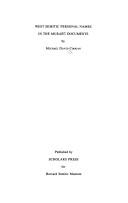
ISBN: 0891300198 9004387781 9780891300199 9789004387782 Year: 1976 Volume: 7 Publisher: Missoula, Montana : Scholars Press,
Abstract | Keywords | Export | Availability | Bookmark
 Loading...
Loading...Choose an application
- Reference Manager
- EndNote
- RefWorks (Direct export to RefWorks)
Names, Personal --- Semitic --- Murašû family --- 892.1 --- -Anthroponomy --- Baby names --- Christian names --- Family names --- Forenames --- Names of families --- Names of persons --- Personal names --- Surnames --- Names --- Onomastics --- Akkadische, Sumerische literatuur --- Murasu family --- Semitic. --- Murašû family. --- -Akkadische, Sumerische literatuur --- 892.1 Akkadische, Sumerische literatuur --- -892.1 Akkadische, Sumerische literatuur --- Anthroponomy --- Murašû family. --- Semitic personal names --- Names, Personal - Semitic
| Listing 1 - 10 of 31 | << page >> |
Sort by
|

 Search
Search Feedback
Feedback About UniCat
About UniCat  Help
Help News
News